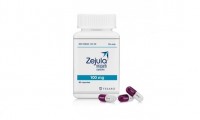-
GSK tees up AstraZeneca rivalry with positive Jemperli-Zejula readout in endometrial cancer
- Source: drugdu
- 205
- December 20, 2023
-
Innovent Announces Publication of Mazdutide (IBI362) Phase 2 Full Results in Chinese Patients with Overweight or Obesity in Nature Communications
- Source: drugdu
- 121
- December 20, 2023
-
With new FDA approval, Merck’s Welireg takes another step toward blockbuster goal
- Source: drugdu
- 92
- December 19, 2023
-
Listing Meeting of Domestic Sacubitril Valsartan Yixintan® was Successfully Held
- Source: drugdu
- 119
- December 19, 2023
-
Blood Tests Used to Hunt for Cancer DNA May Help Detect Cancers Faster
- Source: drugdu
- 86
- December 16, 2023
-
Bristol Myers Squibb to Pay Up to $8.4 Billion to Codevelop Antibody-Drug Conjugate With SystImmune
- Source: drugdu
- 131
- December 14, 2023
-
Automated Device for Non-Invasive Measurement of Cells’ Electrical Properties to Advance Cancer Diagnosis
- Source: drugdu
- 106
- December 14, 2023
-
SystImmune and Bristol Myers Squibb Announce a Global Strategic Collaboration Agreement for the Development and Commercialization of BL-B01D1
- Source: drugdu
- 127
- December 13, 2023
-
Merck and Moderna to Launch Trial of mRNA-4157 Plus Keytruda in Non-Small Cell Lung Cancer
- Source: drugdu
- 100
- December 13, 2023
-
Seagen’s Adcetris and Bristol’s Opdivo boost hopes for another ADC, PD-1 combo
- Source: drugdu
- 113
- December 12, 2023
your submission has already been received.
OK
Subscribe
Please enter a valid Email address!
Submit
The most relevant industry news & insight will be sent to you every two weeks.













